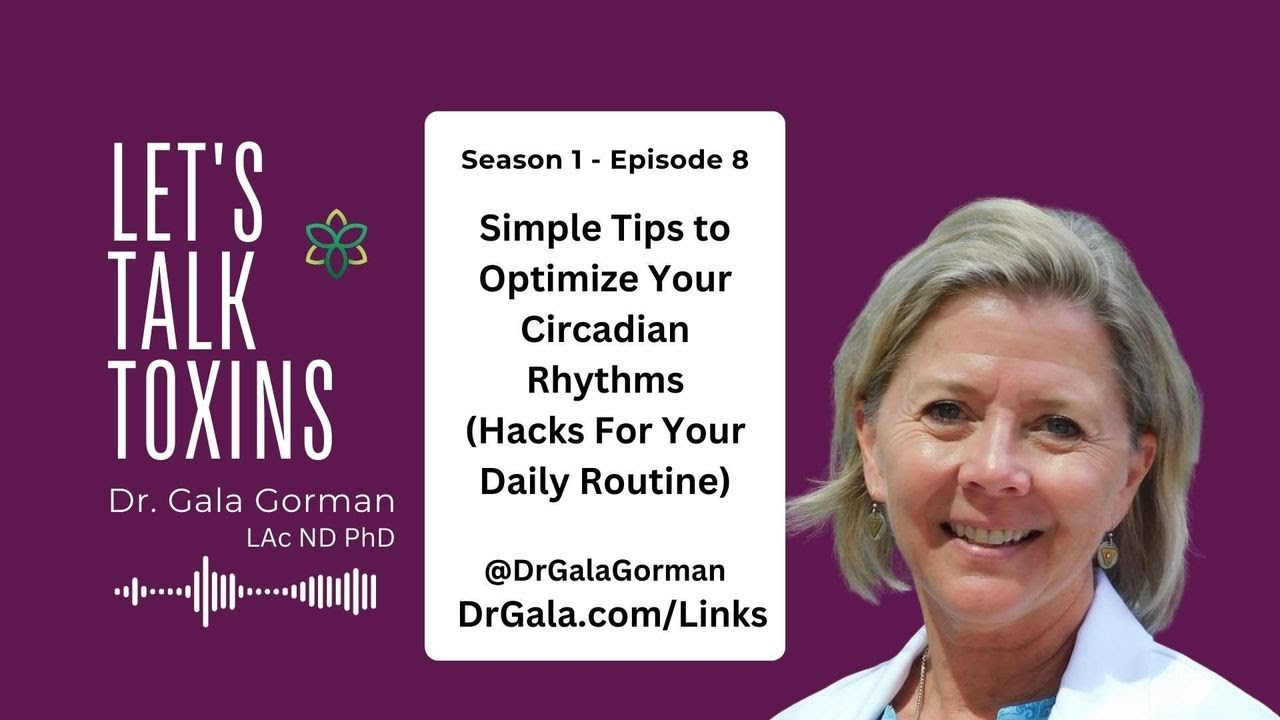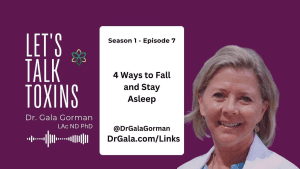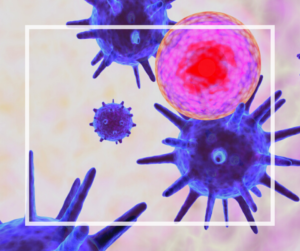NOTE: A machine generated this transcript. Please be aware that it may contain occasional errors in punctuation and spelling.
If you think about tweaking GABA receptor density in the SCN of mice, this impacts their circadian rhythms and it affects behavior and activity patterns. The positively charged amino acid blocks in proteins are crucial for maintaining these persistent circadian oscillations.
Welcome to the Let’s Talk Toxin show. I imagine at some point you’ve experienced the feeling of being in-sync. When that’s our experience, we feel energetic and enthusiastic that starts with our circadian rhythms in the evening, so that you drift off to sleep easily and stay asleep all night.
In this episode, we’ll be exploring some tips to optimize your circadian rhythms with easy hacks to improve your daily routine for better sleep. And if you’re new here, I’m Dr. Gala Gorman, a licensed acupuncturist, naturopath, and author of “What’s Your Kryptonite?”. I wrote the book to help women understand the effects of chronic stress that’s turned toxic.
In the book, I share the MOLT Method™ I developed to make it easy to shed stress, along with the accumulated toxicity, just like any other creature in nature that’s outgrown its trappings. So that you can cruise through midlife and beyond symptom-free. So that you can put an end to health issues like chronic fatigue, insomnia, mood swings, and even weight gain.
MOLT, in this case, is an acronym. The T stands for toxins, and I can say with confidence that every symptom is caused by accumulated toxicity. I evaluate 12 categories of toxicity when I’m working with someone to unravel a health mystery. Our world is full of man-made substances that our bodies were not designed to deal with. Couple this toxicity with an overwhelming amount of toxic stressors the body was designed to manage and it’s no wonder women find themselves playing whack-a-mole with symptoms.
In this segment, I share information from research studies related to toxicity. You can think of it as a Toxin Trend. So, in this report it’s a great example of a toxin trend related to a new approach to manipulating circadian rhythms, and the researchers at Washington University in St. Louis found that tweaking the density of GABA receptors and the suprachiasmatic nucleus, the SCN of mice, significantly altered their daily rhythms.
Additionally, a study at Rensselaer Polytechnic Institute discovered that positively charged amino acid blocks in certain proteins play a crucial role in maintaining persistent circadian oscillations. So, if you think about tweaking GABA receptor density in the SCN of mice, this impacts their circadian rhythms and it affects behavior and activity patterns. The positively charged amino acid blocks in proteins are crucial for maintaining these persistent circadian oscillations.
This actually transforms our molecular clock into continuous oscillators, which is essentially what they are. Basically, these mechanisms are keeping our body on its natural rhythms. When you find that you are getting tired around, you know, nine, 10 o’clock at night, or when you’re waking up naturally you know, six or seven in the morning. When you find that you’re naturally hungry at a certain time of the day, all of those things are related to our circadian rhythms.
You might even be one of those people that are really fortunate to have a really regular bowel movement that happens just like clockwork at a specific time of the day. And that is all regulated by these circadian rhythms. And so we are finding that if they will align medical treatments with the circadian rhythms, they’ll have better efficacy and even reduce side effects.
So if you think of the GABA receptors, GABA and serotonin are very tightly correlated and serotonin production starts in the gut. So this is just one more thing that points us back to really emphasizing and focusing on improving gut health and digestion to improve overall health and wellbeing.
In chapter 12 of my book, “What’s Your Kryptonite?”, I dedicated it to helping readers manage what I refer to as Tricky Toxins. Our bodies are bombarded with toxicity, so we have to learn to manage it. Just comment, “tricky toxins”, and we’ll send you a link where you can download the chapter for free. If commenting isn’t convenient, go to DrGala.com/Links and sign up for my Wellness Weekly newsletter.
You can respond to any email you received from me with “tricky toxins” and we’ll send you a link. So every suggestion you’ll hear from me has been tested in the trenches. And that includes saying no to symptom suppression. Over the past four decades, I’ve developed processes that work sustainably. Typically requires a combination of approaches that I’ve synthesize to address the health issues that show up repeatedly for many women. In this segment, I’m opening the kimono to share how I was challenged to apply my suggestion.
I’m Walk My Talk, and here’s an example. Well, I share in my Human Energy System Reboot the importance of consuming enough protein. And so it’s really challenging as we’re leaning into fasting or maybe finding that our digestion has just slowed a bit and maybe we feel comfortable not eating as many meals.
It becomes really challenging to get enough protein. And especially in the evening, it’s very common in the evening to turn to some carby snack. Most snack food is very high carbs, and very low in protein. And so what I found was that I needed to have a plan for a protein-dense snack to have in the evening. When I felt like I just wanted some little something, and I don’t mean evening eight or nine o’clock at night, I’m talking evening, 5, 6, 7 at the latest. But in that sort of top off the tank kind of last snack, I really needed to make sure that it had enough protein. And so one of the things that I did was created some Turkey salad just to have available in the refrigerator.
I can eat Turkey salad with some gluten-free crackers and I really find that it’s satisfying and and really takes the edge off and gives my body those additional amino acids. Like we just talked about in the circadian rhythms and how important it is that those amino acids are helping to maintain those circadian rhythms.
As I mentioned, I sometimes will eat at six or even seven at night, but I can only do that and get away with it if it’s a really protein dense snack. And so you really have to plan ahead if your main meal is earlier in the day, that it’s the way I typically recommend that you eat practicing early time restricted eating.
Then if you really feel like maybe your main meal was too early or you know, you left too much of a gap and you feel like you need to have something a little later than this, a really protein-rich snack is going to really help. And that’s what I found, I found that I really had to plan ahead and I have to make sure these things are in the refrigerator.
Honestly, even if they end up going to waste, if I have it available, it’s just one of those safety net kind of things that you need to have ready so that you don’t turn to carb heavy snacks like popcorn and other sort of carb heavy snacks.
So, some of the ways that we can optimize our circadian rhythms are just what I mentioned here including really keeping our amino acid levels optimal and giving our body those raw building blocks it needs to be able to create energy.
So when I’m done here, drop a comment and let me know what you’ve experienced when you’ve struggled to stay in sync with your circadian rhythms and how you know, when you’re in sync or when you’re not. So as we talk about these circadian rhythms, just know that in Oriental medicine, we have a 24-hour clock in two-hour segments that ties to each of our Meridians or our energy systems in the body.
And there’s 12 main energy systems and two additional systems that are not included in this 24-hour clock. So we correlate each of these body systems to a two-hour segment. And there have been a lot of ancient medicine practices that have based their structure around something similar.
This isn’t entirely unique and as you can see from just research circadian rhythm manipulation is not a new thing. But in Oriental medicine, we don’t call it circadian rhythms, but for these purposes, that’s what I’m referring to it as. So generally speaking from 11:00 PM to 5:00 AM, we are hardwired to sleep. And so during this period of time, this six-hour period of time, our gallbladder, liver, and lung energy systems are activated. And essentially what these three systems are doing are burning off all of the excess sugar, carbs that we’ve consumed.
We’re helping to sort of flip the switch to burn fats. We’re purifying the blood. We are flushing the toxins out into our elimination systems so that when we’re up and about in the next day, our body will be able to excrete things. You know, sometimes, you might think like, “how does lung fit into this?” But actually, as we breathe, bringing that air in is a big component of how our body makes fresh blood.
So it’s really important these three systems essentially that we have freed up enough energy so that those systems are not still trying to digest food that we’ve just consumed shortly before bed while the systems are really needing to do a lot of repair and maintenance.
The more advanced we get in years, the more toxicity we have to manage. The more stressed our life is, the more we really need to honor this 11:00 PM to 5:00 AM window for sleep. So how do we help to really set and maintain our circadian rhythms, and the best way to do that is with the sunrise and the sunset.
And the easiest way I find to do this is to walk in the morning. You kind of get a double benefit if you’ll walk in a fasted state because your body has just burned off, typically kind of the last of the sugar from the day before. It’s already ready to burn fat and so if you exercise without eating in the morning, your body will be more likely to burn fat. The sunlight also helps to produce vitamin D and that is a hormone that really helps us with metabolism.
And so again, double whammy and this sunrise period when we can get outside and we can acknowledge that the sun earlier in the day that helps to trigger our circadian rhythms and kind of manage that period of time. In the evening, it can be equally as beneficial to do what I talk about as a post prandial perambulation. This is what my husband’s family called an after-dinner walk.
And so they’re Mediterranean and they eat a lot later. And I think seem to get away with it. I’ve got some speculation about why that might have been. I don’t believe it says easy to do that these days in part, because our food supply is much more toxic and our world is much more toxic now. But in the evening early evening, if you will take a walk as the sun is starting to set. That again, we’ll kind of bookend your circadian rhythms and help to anchor your circadian rhythms around the sunrise and the sunset.
This actually activates your pineal gland and your melatonin production regulates your melatonin production. And that’s really another one of the main hormones that keeps all of this in sync. This, in particular, 11:00 PM to 1:00 AM period, remember that’s the period of time that correlates to your gallbladder? This is the critical period of time that sort of jumpstarts this repair and maintenance process.
And so if you are focused on getting enough sleep. You can wake up earlier if you need to, but going to bed later will really catch up with you and not in a good way. So you really want to honor this 11:00 PM to 1:00 AM period. That’s when you should be getting your really, really sound sleep.
Sleep really is less about the number of hours and more about the period of time and getting the sound sleep during this 11:00 PM to 5:00 AM period. What does this mean? This means that you need to start preparing for sleep around 8:00 PM. And so if we have to kind of get into sleep mode, two or three hours prior to bedtime. Then 8:00 PM tends to be that period of time where you really need to start being in wind-down mode.
This means that you need to be managing your exposure to blue light and really making sure that you’re protecting your nervous system and not engaging in anything that’s really going to activate your sympathetic nervous system. You need to really be be in relaxation mode.
I have a couple of things I still want to share with you so that you can stay in sync with your circadian rhythms. But remember, you can get the Tricky Toxins chapter of my book, “What’s Your Kryptonite?” for free. Just comment, “tricky toxins”, then we’ll send you a link where you can download the chapter. If commenting isn’t convenient, go to DrGala.com/Links and sign up for my Wellness Weekly newsletter. You can respond to any email you received from me with “tricky toxins”, and we’ll send you a link.
Now let’s continue with a couple of additional things I want you to know about aligning with your body’s natural rhythms. And don’t forget when I’m done drop a comment and let me know how you stay in sync.
So, back to this 11:00 PM to 5:00 AM window, I know you’re probably saying, okay, I get it. But it really helps I think when you understand how important this period of time is for supporting your body to detox. And keep in mind that honestly, everything revolves around detox, especially these days, because we are bombarded with toxicity from every angle.
So, our gallbladder really supports digestion. On a side note, if you’ve had your gallbladder removed, then you really need to make sure that you are supplementing with bile salts, high-quality bile salts. Because you need to be supporting your digestion and your gallbladder is a really critical component here. And if it’s not there, then a lot of times the medical establishment will say, “Well, your liver will take care of it.” But our liver is overburdened already, so we do not need all that extra burden to be falling on our liver.
In fact, our liver is responsible for filtering the blood, and that is the next period of time, the period of time from one to three. Some people will find that they’re waking up between one and three, and this tends to point to a problem with some. Liver congestion. And so again, one to three really important.
And then if you’re moving along, maybe you’re finding that you’re waking up a little later than that. You may actually have some congestion in your lungs and you may not even really know what’s going on there. But your lungs really refresh your blood and everything that is done to support our blood production. And cleaning our blood is critically important to keep our body healthy and also producing energy, keeping our human battery recharged.
So, if you’d just like to understand a little bit more about how this 24-hour clock works and essentially what it looks like. The period of time from about 7:00 AM to 3:00 PM, the organ systems and the, you know, all the systems that are involved there during that period of time are primarily related to digestion.
So this is the period of time where our body is designed to consume food and digest it. This is why you’ll hear sometimes about a 16:8 fasting period, meaning an eight-hour eating window. And most people think that you know, they can eat at any time like that eight-hour eating window is negotiable. But honestly, it’s not. The eight-hour eating window needs to be from 7:00 AM to 3:00 PM, and I know that can be problematic for a lot of people.
And that’s why we talked earlier about potentially having a really high-protein snack available. If you find that you really need to eat something a little later than that. Just as a side note the other window of time that we’re not addressing here is 5:00 AM to 7:00 AM. And during that period, it’s our large intestine that is being supported and the circadian rhythms are active during that period of time.
And this is the time when our bodies are really designed to have a bowel movement. We should be having one significant bowel movement a day and it typically needs to be between 5:00 AM and 7:00 AM. Of course, that would require that you’re really honoring all these other periods of time and that you’re really in sync with your circadian rhythms.
Honestly, this is one of the ways that you really tell that that’s happening. And then 3:00 PM to 11:00 PM, that period of time is when we’re basically taking what we’ve consumed and sort of manage the initial part of the digestion. And now we’re actually taking those raw building blocks that we’ve consumed and we’re converting that into nutrients and into energy from around 3:00 PM to. 11:00 PM.
And then we’ve talked a lot about what happens between 11:00 PM and 5:00 AM. So that really takes us through the entire 24-hour clock. And now it’s up to you, you know, how close you feel you are to aligning with the circadian rhythms. And if you don’t feel like that’s happening, then you want to start by honoring sunrise and sunset and really working towards making sure that you’re getting your sound sleep between 11:00 PM and 5:00 AM and that your main meal is consumed before 3:00 PM.
And so if you’re doing all of that, then your body should just naturally, over a period of time, it’s not going to happen overnight, but it should just naturally return to just a normal rhythm that is is aligned with with really the universe. This is not just an individual. This is really a much bigger, energetic environment that we are just one little component of.
The answers I give to questions I receive quite often apply to and would be helpful for most women. I’ve accumulated a few related questions and I’ll answer them in this segment, which I call Ask Away. If you’d like to ask a question, I created a form so that it sure to get answered. And your question could be shared in a future episode, helping many other women. So comment “QUESTION,” and we’ll get you a link to the form. If commenting isn’t convenient, go to DrGala.com/Links and sign up for my Wellness Weekly newsletter. You can respond to any email you receive from me with “QUESTION” and we’ll send you a link.
Does the timing of our meals really affect our circadian rhythms and what health improvements should I expect?
Well, I can definitely tell you that practicing ETR, early time-restricted eating, will improve your health. Our body is designed to consume food between 7:00 AM and 3:00 PM. And our 24-hour clock that we use in Oriental medicine, but that is also aligned with this thing known as circadian rhythms. 7:00 AM to 3:00 PM, the two-hour segments in that eight-hour window are aligned with the organs that are primarily associated with the early stages of digestion.
So, if you ask me, does this really improve your health? I will say that early time-restricted eating is just one of the things that will help you reestablish alignment with your circadian rhythms. Your circadian rhythms are going to be controlled more by your sleep. And so really honoring that 11:00 PM to 5:00 AM period of time for your sleep but you’re gonna find that if you eat earlier, your main meal that it will be easier to fall asleep and stay asleep. And as a beautiful side effect, your weight will be much easier to manage because our body will actually be able to process what we have consumed.
So there’ve been studies that have been done that have shown that just practicing early time-restricted eating without restricting calories, without even significantly improving diet, has actually made significant improvements to metabolic health and other health markers, cardiometabolic health, that sort of thing.
So it’s really, really something that is worth at least putting some effort into, to help to get yourself back on track here. If you find that you feel like you’re really off, if you haven’t been sleeping soundly. Then I would say yes, using early time-restricted eating will help you to re-establish even your sleep patterns, and re-establishing your sleep patterns is going to go a long way to really getting everything back in sync.
What’s the best time to exercise to align with our body’s natural rhythms? I’m looking to optimize my fitness routine!
Aren’t we all? So, as a starting point, you want to make sure that you’re exercising fasted, meaning that you have not consumed any food. And so that pretty much determines that the best period of time to exercise is going to be in the morning, because if you find like me that by 10 or 11 o’clock, I’m really wanting to eat something unless I’m practicing a more aggressive form of fasting that day. Then, I need to make sure that I get up and do some form of exercise earlier in the day.
The best thing to do in the morning is to walk around sunrise, as close to sunrise as you can get, because that’s also going to really help to align with your circadian rhythms. You’re going to get some really healthy beneficial exposure to the sun that’s going to create vitamin D and really help to enhance your hormones and and really improve your health dramatically.
It’s also important to recognize that we do not need to do extreme exercise. Especially as we age and our adrenal glands are already typically on fumes. This gentle exercise, like walking riding a bike (if you enjoy that) or, you know, even doing some yoga, not really, really, you know strenuous yoga, even just some good, significant stretching, is really beneficial.
Stretching actually puts our internal organs and structures under stress in a good way and is very passive, if you will. So, it makes it something that we can do really easily. It’ll be enjoyable but it really will create improvement, especially if we stick with it over time.
As we get older, do our circadian rhythms change? And how should we adjust our daily routines?
So, I will say that our circadian rhythms do not change over time that actually our circadian rhythms are what they are. But I will say that over a period of time as we age, toxicity accumulates. Our digestion slows down and so it isn’t that our circadian rhythms have changed. It’s that our body is a little less forgiving, and we need to do a better job of managing our circadian rhythms.
So how do we do that? We make sure that we’re moving, and we move primarily in the morning. And we honor the sunrise and the sunset. And we really make sure that we are consuming our main food during the period of time when our body is best equipped to handle it. And we make sure that we’re doing everything in our power to prioritize the period of time between 11:00 PM and 5:00 AM to sleep.
All of these things contribute to just supporting our natural circadian rhythms. If we didn’t get in the way and we didn’t do things that essentially altered our natural rhythms, we wouldn’t have a problem. Our body would maintain it’s normal rhythms. It would stay in sync and we wouldn’t be having this discussion right now. But we’re human. We’ve got all these toxic sources in our world. We’re constantly trying to burn the candle at both ends and do things that sort of defy our body’s natural rhythms.
And when we do that over time, the results accumulate. And then we need potentially more than, the words I typically use, a reboot is typically something that is, you know, 7 to 10 days.
I have a Human Energy System Reboot that you can check out at DrGala.com/Links. But if it’s gone too far, then a lot of times, we’ll need more than a reboot and we need a full reset and that can typically take a month or two or three.
What are some indicators that my circadian rhythms are off? I’ve been feeling a bit out of sync, and I’m looking for some signs.
Well, one of the things that is a clear indication that you’re in sync is when you wake up in the morning, typically between 5 and 7 AM, and you feel the urge to have a bowel movement. That is the time of day when our body is designed to have our large intestine be active. And so if you are one of those people that gets up in the morning and has a bowel movement, that’s a good sign that your circadian rhythms are pretty in-sync.
The other thing I will say is that we should be sleepy by about 10:00 PM. And so I will say too, that some people find that they’re sleepy but then when they go to bed, they’re finding that they don’t fall asleep easily. So if that’s a problem for you, then I would really want you to look at all those things that you’re doing right before bed. Because essentially, you’re creating an internal conflict because your body’s trying to shut down for sleep, and you’re doing things that are interfering with that.
The other thing I will say is that you should be awake by 7:00 AM. Our bodies are hardwired to sleep between 11:00 PM and 5:00 AM. So, by about 7:00 AM, you should really be, you know, up and at ‘em. So if your sleep is off and you’re not doing the rest and repair work, then obviously, you’re not going to feel like getting up at 7:00 AM.
And so, these are all clear indications that your circadian rhythms are out of sync or in sync, if you feel like all of this is working. And so it’s it’s something that you can sort of identify. Are you feeling like you’re ready to go to bed by 10 o’clock at night? Are you awake by 7 AM and feeling pretty much ready to get up? Do you have a bowel movement fairly soon after you wake up in the morning? You know, all of those are indications that your body is functioning properly and in alignment with its circadian rhythms.
How do you manage your sleep and wake cycles if you work nights?
Well, I lived for many years in Las Vegas, and so a very significant amount of the population worked the graveyard shift. And there’s a reason why it’s referred to as the graveyard shift because really it is detrimental to your health and can send you to an early grave if you don’t do a really good job of managing this.
Now, I’m not saying that anyone who works nights is doomed, but I will say that this is not something to be taken lightly. Again, our bodies are hardwired to sleep between 11:00 PM and 5:00 AM. And so if you need to essentially adjust your body’s clock to completely work on a different schedule, then you’ve got to make sure that you live on that adjusted schedule seven days a week, 24/7.
Which means that if you think about it, if you’re sleeping from 11:00 AM to 5:00 PM, then everything is flipped. Everything should be flipped. When you’re eating, it should be flipped. When you’re sleeping, it should be flipped. And you need to make sure that you’re using fake light as much as possible so that you’re mimicking the daylight whenever you can. Now, this is not that difficult if you’re working somewhere where you’re under lights. It would be awesome if you were using some daylight bulbs so that it was really mimicking the daylight in this environment that you’re working in.
But more importantly, even than that is when you’re sleeping and that you’re able to create an environment that is a hundred percent dark. If you are trying to simulate this experience of sleeping at night, but it’s really broad daylight outside. Then how are you going to create an environment in your home that is conducive to maintaining your health, even though you’re going against its natural rhythms?
It can be a little easier if you’re living alone or only with people who are working a similar sort of schedule. But if you are trying to keep a foot in both worlds and trying to, you know work some days at night and then trying to switch back to days a couple of days a week and trying to go back and forth. This is a recipe for dis-ease escalating to disease, and you will quickly find that you’re accumulating all sorts of symptoms. Tends to be, you know, start with weight accumulation, but then other symptoms will start popping up. And this is just a sign that your body is accumulating toxicity because it’s not able to do the rest and repair work that it’s designed to do between 11:00 PM and 5:00 AM.
And remember, if you’d like me to answer your specific question, make sure to comment on the “QUESTION,” and we’ll send you a link to the submission form. You’ll want to subscribe to the channel notifications to get regular updates. And that’s a wrap for this episode. This has been the Let’s Talk Toxins show. Make sure you subscribe to my channel on YouTube and activate the notifications.
You’ll get a reminder when I’m going live next until then. Be well.













